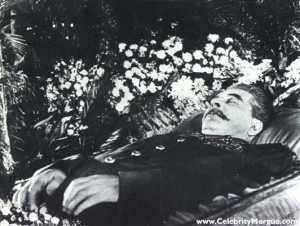When we try to add some kind of personal moral effort back into our life as a Christian, it is like asking Joseph Stalin to come back to life to reform Russia.
5 For if we have become united with Him in the likeness of His death, certainly we shall also be in the likeness of His resurrection,
6 knowing this, that our old self was crucified with Him, in order that our body of sin might be done away with, so that we would no longer be slaves to sin;
7 for he who has died is freed from sin. Romans 6:5-7 NASB
Let us make an end: as long as you are struggling like the Pharisee to be alive in your own eyes–and to the precise degree that your struggles are for what is holy, just, and good — you will resent the apparent indifference to your pains that God shows in making the effortlessness of death the touchstone of your justification. Robert Farrar Capon
If the touchstone of faith is not death, but rather moral reform, then salvation is not a gift. If someone is dead, they can do nothing. They certainly cannot raise themselves from the dead. Perhaps if someone has very recently died, some other person, a doctor or emergency attendant might do some extraordinary work and bring someone back to life. However, there is no idea that a person who has died can do anything to resurrect themselves. Jesus surrendered completely to the Father’s will in complete trust that He would be resurrected.
And so, dying may be arduous and drawn out and painful, but death is effortless. We come saying, I have nothing, I cannot be moral. I have failed and will continue to fail. I give up. I clearly cannot do this. My repentance is repugnant. Just as the law killed Jesus, it kills us. We cannot conform. Its edicts only inflame our sinful passions. If you tell me not to commit adultery, I dream of adultery, my desire is drawn to its forbidden charms. Forbidden sex becomes the only sex I want.
And so, Christ lays it to rest. Our moral drive and failure, our precious knowledge of good and evil, is a psychopathic maniac that society heaves a sigh of relief over when it is put down.
So we are justified as a gift, because receiving a gift is all we are capable of, in the same way that a dead man can only be resurrected if there is a miracle completely outside of any action he takes. Anything other than a gift with no strings attached whatsoever will not work, because only death can be the touchstone. When we try to add some kind of personal moral effort back into our life as a Christian, it is like asking Joseph Stalin to come back to life to reform Russia. Nobody wants that. I do not want my old self resurrected to orchestrate my moral reform.
The new self does not respond to threats of punishment nor does it conform to coercive tricks of the moral law. It seeks only love from a pure heart, meaning that desire and freedom only rule the roost. We die to sin, meaning we die to the constant judgment of good and evil we inherited from Adam. The life of the Spirit is a life of love and gift and gratitude without thought of merit or deserving, whether towards ourselves or towards others.


You do know that Capon is an universalist, don’t you?
You do know that Capon is an universalist, don’t you. I would just use the idea, qualify that universalism is wrong, without giving the impression that I endorse Capon. I do the same with CS Lewis or Bonhoffer.
I disagree. To quote him from his mockingbird interview:
“For example, who is in heaven? People think it is good guys. There is nobody in heaven but forgiven sinners because there was nobody available to go to heaven except forgiven sinners and there is nobody in hell except forgiven sinners. The difference is that in heaven they accept the forgiveness, in hell they reject it. That’s it.”
Doesn’t sound like universalism to me. Maybe it depends on your notion of universalism.